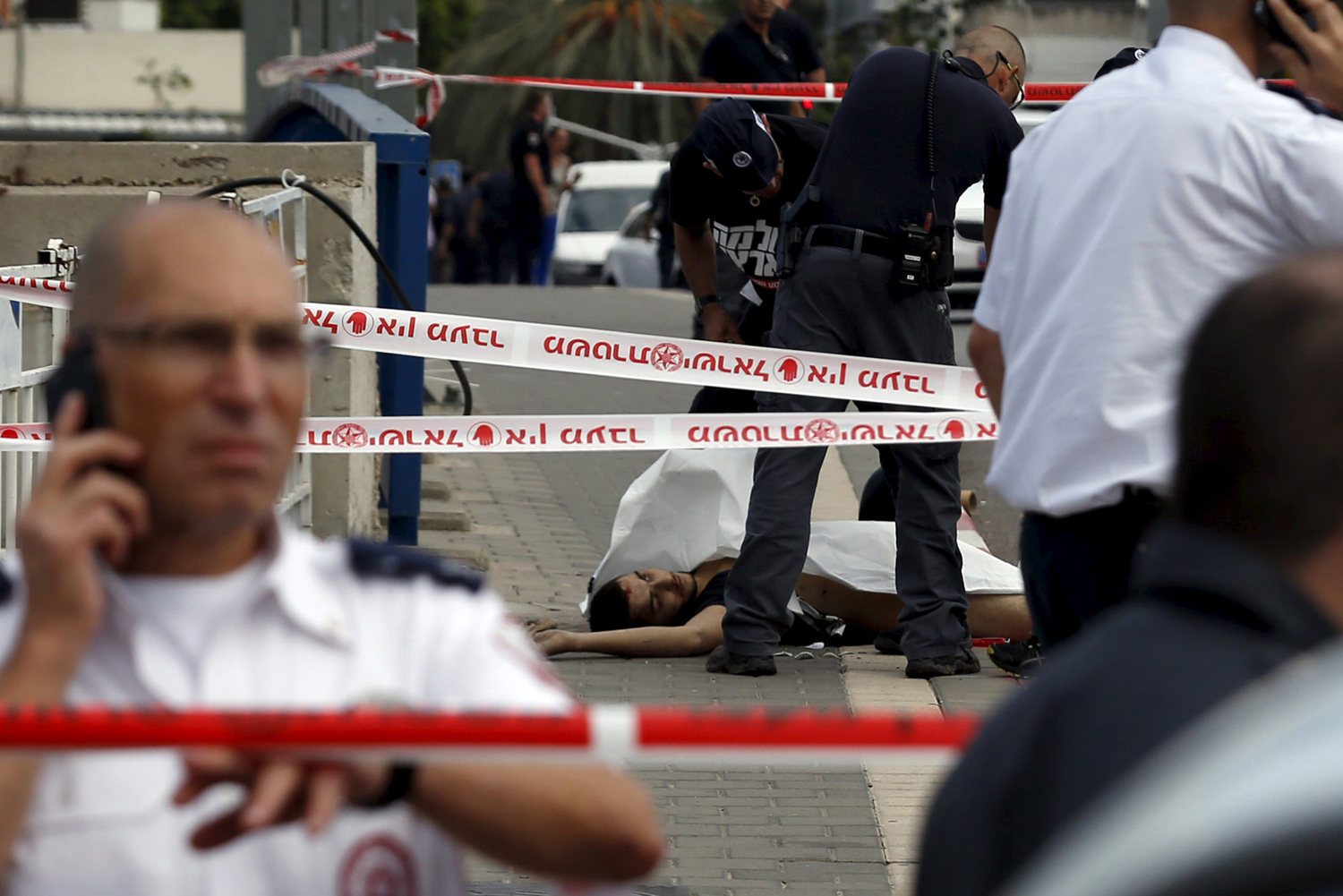Most Palestinians do not support ISIL

A Palestinian lies dead, shot after he tried to stab a soldier. Photo by Baz Ratner / Reuters
Palestinian Stabbings Could be Inspired by Islamic State Propaganda
Polls shed light on attitudes towards the group
By Robert Swift, The Media Line
November 25, 2015
Over the past two months, Palestinians have taken sharpened knives at least 74 times, and attacked Israelis, killing 23 and wounding dozens. While there have been isolated stabbings in past years, this wave of violence is being called the “knife intifada”, using the Arabic word for Palestinian uprising.
A stabbing brings the attacker in intimate contact with the victim. As a tool of terrorism, meant to frighten a population, it has scared Israelis, many of whom now carry pepper spray hoping to be able to defend themselves.
Some Israeli analysts say these attackers are inspired by Islamic State, which has widely publicized gruesome videos of beheadings of foreign captives using knives. The Islamic State also has glossy magazines and a slick PR machine that glorifies these killings.
“Psychologically, subconsciously, the beheadings of the Islamic State have an influence on Palestinian attackers,” Shaul Shay, a military historian with the Institute of Policy and Strategy, IDC Herzliya, told The Media Line. “At the same time, no terrorists or their family, claim they carried out the attacks on behalf of the Islamic State or as a result of their influence.”
The success of the Islamic State’s propaganda can be seen in that thousands of foreign citizens have been convinced to leave their lives and join the group in Syria, Shay suggested. Among Palestinians, at least 100 Palestinians have reportedly joined the Islamic State to fight, many of them from the Gaza Strip, and at least four have reportedly been killed while fighting.
Polls show some contradictions in Palestinian support for Islamic State. A poll conducted by the Palestinian Center for Policy and Survey Research conducted in October found that “91% (of Palestinians) believe that ISIS is a radical group that does not represent true Islam and 6% believe it does represent true Islam.”
At the same time, other polls have found that almost one-quarter of Palestinians have “a positive attitude” towards Islamic State, which translates into close to one million Palestinians. Islamic State flags have been seen at several recent demonstrations in Gaza.
Arguing about the influence of the Islamic State on Palestinians who conduct attacks against Israelis is essentially ignoring the “core issue” and “the white elephant in the room,” Samir Awad, a professor of political science at the Birzeit University in the Palestinian Territories, told The Media Line. “This is a question that is advocated and promoted by Israel (as) they cannot seem to understand that no people will accept occupation,” Awad said.
There are also some Arab citizens of Israel who support Islamic State. In October, an Arab citizen from northern Israel flew a hang glider across the border into Syria, presumably to join Islamic State. In September, Israeli security officials arrested three Arab citizens of Israel they said were planning attacks on behalf of ISIS. Israeli security officials have previously stated that they believe 40 citizens have traveled to Iraq or Syria to join the Islamic State.
However, the number of genuine sympathizers among Israeli Arabs is very low and only a little higher among Palestinians – 200 to 300 people – Shay said. Partly this can be seen due to the efforts Fatah (which controls the West Bank) and Hamas (which runs Gaza) make to reduce the influence of Islamic State, who they see as a threat to their power, Shay explained.
In a recent poll by Sammy Smooha of Haifa University, 18 percent of Israeli Muslim respondents said they disagreed with the statement that ‘the Islamic State is a terrorist organization that I am ashamed of.’
The findings of the report – entitled Still Playing by the Rules: The Index of Arab-Jewish Relations in Israel 2015 – do not necessarily show that 18% of Muslims support ISIS or their actions, Sammy Smooha told The Media Line. “Most Arabs in Israel feel that there is need in the Middle East for a group or a country that can stand up to Israel. ISIS is such a group,” the professor suggested. The Islamic States’ ability to oppose Israel, and even world super powers, garners the group respect but not necessarily support, Smooha suggested, pointing to Iran or Hizbullah as actors that played similar roles in the past.
A perception among Israeli Arabs that they are discriminated against encourages some to register their protest by “expressing sympathy to groups or movements that are hostile to Israel,” Smooha said. This is similar to the propensity to deny the authenticity of the six million Jewish deaths during the Holocaust, as expressed by 31% of Arab Israelis surveyed, the professor concluded.
Linda Gradstein contributed to this article.
